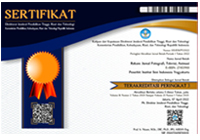Homelander and The Ambiguity of Morality in the Television Series the Boys
Abstract
Morality, as a dynamic component of culture, constantly shifts in response to social and ideological transformations. In the landscape of popular culture, the superhero figure has long served as a manifestation of moral values and an ethical compass for society. However, the series The Boys (2019) presents a deconstruction of this traditional representation through the character of Homelander, who symbolises moral ambiguity and corruption resulting from absolute power—standing in stark contrast to the idealised image of Superman. This study employed a qualitative method grounded in critical theory and Jacques Derrida’s deconstruction framework to examine how morality is represented and destabilised within the narrative of the series. Primary data were collected from selected episodes across three seasons of The Boys, focusing on three key scenes: the airplane incident in Season 1, Episode 4; the confrontation with Blindspot; and Homelander’s public speech in Season 3. Analysis was conducted on dialogue, character interactions, and visual aesthetic elements such as costume symbolism, lighting, and camera composition. Secondary data consisted of scholarly articles, books, and theoretical texts discussing superhero morality, Derrida’s deconstruction, and media representation politics. The analytical process involved three interrelated approaches: (1) narrative analysis to explore story structure and character development; (2) visual analysis to interpret symbolic and aesthetic elements that construct Homelander’s moral image; and (3) deconstructive analysis to apply the concepts of différance, trace, and critique of grand narratives and binary oppositions within discourses of heroism. The findings indicate that Homelander is not merely a symbol of moral decadence, but also a critique of capitalist institutions that exploit the superhero image for power and economic gain. From a deconstructive perspective, Homelander is not a fixed signifier, but a trace whose meaning is continually deferred and shaped by the forces of capitalism, media, and corporate spectacle. Thus, The Boys functions not only as entertainment but also as a reflective space for reexamining discourses on morality, heroism, and power in contemporary popular culture.
Keywords
Full Text:
PDFReferences
Aliev, R. T. & Tembo, K. (2020). “Make the Superhero Great Again!”: Introduction to the Issue. Galactica Media: Journal of Media Studies, 2(3), 15–25. https://doi.org/10.46539/gmd.v2i3.123
Caeners, T. (2023). Patchworking the Man of Steel. Myth, Classical Heroes, Circus Strongman and the Creation of Superman. In Classical Heroes in the 21st Century (pp. 29–50). Ergon – ein Verlag in der Nomos Verlagsgesellschaft. https://doi.org/10.5771/9783987400759-29
Dalberg-Acton, J. E. E. (1997). Essays on Freedom and Power (G. Himmelfarb, Ed.). The Free Press.
Del Campo, M. M. (2020). Sympathy for the devils: An analysis of the villain archetype since the nineteenth century. Journal of Myth and Literature Studies, 20(1), 25–39.
Derrida, J. (1982). Margins of Philosophy. University of Chicago Press.
Dimmock, M. & Fisher, A. (2017). Ethics for A-Level. Open Book Publishers. https://doi.org/10.11647/OBP.0125
Haqqu, R. & Pramonojati, T. A. (2022). Representasi Terorisme Dalam Dua Adegan Film Dilan 1990 Dengan Analisis Semiotika John Fiske. Rekam, 18(1), 67–80. https://doi.org/10.24821/rekam.v18i1.4762
Hassler-Forest, D. (2015). Superheroes and the law : Batman, Superman, and the ‘big other’. In L. De Sutter (Ed.), Zizek and Law. Routledge.
Koole, S. L., Fockenberg, D., Tops, M. & Schneider, I. K. (2013). The Birth and Death of the Superhero Film. In Death in Classic and Contemporary Film (pp. 135–150). Palgrave Macmillan US. https://doi.org/10.1057/9781137276896_9
Korte, B. & Falkenhayner, N. (2021). Heroes in Contemporary British Culture. Routledge. https://doi.org/10.4324/9781003129141
Leach, S., Kitchin, A. P. & Sutton, R. M. (2023). Word embeddings reveal growing moral concern for people, animals and the environment. British Journal of Social Psychology, 62(4), 1925–1938. https://doi.org/10.1111/bjso.12663
Lim, W. M. (2025). What Is Qualitative Research? An Overview and Guidelines. Australasian Marketing Journal, 33(2), 199–229. https://doi.org/10.1177/14413582241264619
Nayak, S. K. (2017). The Phenomenon of Deconstruction versus the Inherent Desire of Text. International Journal of Trend in Scientific Research and Development, Volume-2(Issue-1), 62–68. https://doi.org/10.31142/ijtsrd5863
Radošinská, J. & Magalová, L. (2022). Supes, Inc.: Episodic Television Drama The Boys, Antiheroism and Society of Performance. Media Literacy and Academic Research, 5(1), 27–52.
Rook, S. M., Stephenson, N., Ortega, J., de Calvo, M. P. C. & Iyer-Eimerbrink, P. A. (2021). Morality Development and Its Influence on Emotion, Attitudes, and Decision Making. Psychology, 12(10), 1722–1741. https://doi.org/10.4236/psych.2021.1210104
Stanley, J., Setyadi, Y. & Rudy. (2021). The depiction of tolerance in American superhero films. Jurnal Bahasa, Sastra, Dan Studi Amerika, 27(1), 13–21.
Surur, M. (2024). Elemen-Elemen Black Comedy dalam Film The Menu. Rekam, 20(2), 173–191. https://doi.org/10.24821/rekam.v20i2.12037
Umar, M. (2024). The Theory of Deconstruction and Its Significance in Developing the Reading Skills. International Journal of Science and Research (IJSR), 13(5), 1465–1471. https://doi.org/10.21275/SR24526003427
Wang, J. (2024). Manipulation and Control by Large Corporations in American Society -- Analysis of Superhero Television Series ‘The Boys’. Communications in Humanities Research, 34(1), 243–248. https://doi.org/10.54254/2753-7064/34/20240065
Wheeler, M. A., McGrath, M. J. & Haslam, N. (2019). Twentieth century morality: The rise and fall of moral concepts from 1900 to 2007. PLOS ONE, 14(2), e0212267. https://doi.org/10.1371/journal.pone.0212267
Woo, J. (2023). Examining a Late Development in Kant’s Conception of Our Moral Life. TheoLogica: An International Journal for Philosophy of Religion and Philosophical Theology, 8(1). https://doi.org/10.14428/thl.v8i1.65623
Wright, O. (2025). ‘On My World, It Means Hope:’ Superman as Symbolic Propaganda to Cultural Icon, 1939-1945. New Errands: The Undergraduate Journal of American Studies. https://doi.org/10.59236/ne6161059
Yegen, C. & Abukan, M. (2014). Derrida and Language: Deconstruction. International Journal of Linguistics, 6(2), 37. https://doi.org/10.5296/ijl.v6i2.5210
DOI: https://doi.org/10.24821/rekam.v21i2.14555
Refbacks
- There are currently no refbacks.

This work is licensed under a Creative Commons Attribution 4.0 International License.




